Randy Alcorn's Blog, page 88
April 6, 2020
In Many States, You Can’t Get a Routine Surgery or a Colonoscopy Right Now, But You Can Still Get an Abortion

Last week Breakpoint’s John Stonestreet shared this commentary related to abortion and the coronavirus crisis:
All crises reveal what’s truly important to us.
For example, in Massachusetts, hospitals are postponing all “‘non-essential surgeries’ in order to prepare for the potential onslaught of coronavirus cases.”
But how do you define nonessential? A person in constant, excruciating pain could consider hip-replacement essential to their well-being, or a colonoscopy could be essential to prevent or detect colon cancer before it spreads.
In Massachusetts, those procedures didn’t fit the definition of “essential.” But guess what did? Abortion.
So, a colonoscopy, which could literally save a life if timely, is non-essential, but an abortion, which literally takes a life, is essential? Postpone an abortion and, in the worst case, a child is still alive but given up for adoption a few months later.
Gloria Steinem once said that “If men could get pregnant, abortion would be a sacrament.” Apparently, in Massachusetts at least, the coronavirus has revealed it already is.
LifeNews has a list of the U.S. states that have shut down abortion clinics right now, and the states that are still allowing them to operate.
The list doesn’t include the status of my home state of Oregon, but one clinic in Portland says on their website, “[We believe] it is our responsibility to stay open so that we may continue to provide safe and legal abortions.” They list some restrictions, including checking temperatures and not bringing any guests.
My friend Kathy, who has prayed outside this clinic, writes, “I do think that with their slight restrictions it could possibly save some lives because they have to go in alone and most people have someone with them. This might give them pause to reconsider, and we can pray for that!” (The Planned Parenthood website says several clinics in Oregon are temporarily closed to in-person appointments.)
Writing for Care Net, Heather Creekmore says,
As our nation’s activity screeches to a halt to stop the spread of COVID-19, I find it curious that some Planned Parenthood facilities are still open and performing abortions.
Specialists of all kinds have been asked to stop seeing patients, while citizens are asked to postpone all elective surgeries so we can preserve sorely needed medical equipment like masks and gowns.
But abortion services continue?
Last week, the National Abortion Federation announced the following: “During this public health crisis, pregnancy care, including abortion care, remains an essential health service.” Calling abortion a “time-sensitive service,” the NAF argues that deferring abortion to a later time is unacceptable, as abortion is an “essential business.”
Even a headline from pro-choice news outlet, vox.com, says, “Advocates say all abortions are essential.” (emphasis mine)
But doesn’t this contradict much of what the industry promotes? Haven’t we been told that abortion is about “choice”? If so, then abortion seems to clearly fall in the elective procedure category.
You might also like to check out the April 1 episode of Focus on the Family, featuring Drs. David Hager and Bill Lile, who provide a prolife perspective on the growing national controversy about whether abortion should be considered essential healthcare during the coronavirus crisis.
Focus on the Family has put together a great prolife prayer guide during this coronavirus crisis. It includes prayer ideas for foster children, the elderly, and those with special needs, as well as these prayer points for single moms and pregnant women:
Pray for those women who are pregnant and considering an abortion and don’t know where to turn. Pray that they will receive love, compassion and support from God's people, and that they would choose life.
Pray for the mothers who have chosen life. Ask that God would provide for them and their children.
Pray that local churches will rally behind Pregnancy Resource Centers with supplies, prayer and support.
Pray for local Pregnancy Resource Center directors across the country—that they would be encouraged, uplifted and protected.
Browse more prolife articles and resources, as well as see Randy's books Why ProLife? and ProLife Answers to ProChoice Arguments.
Photo by Christopher Boswell on Unsplash
April 3, 2020
Max Lucado on Three Essential, Emotional Tools to Survive This April

Matthew Henry said, “Happy are those who have the Lord for their God, for they have a God that they cannot be robbed of. Enemies may steal our goods, but not our God.”
Joshua 1:9 offers this encouragement: “The Lord your God is with you wherever you go.” Jesus promised His disciples, “I am with you always” (Matthew 28:20). Here is a source of both comfort and courage: “Fear not, for I am with you; be not dismayed, for I am your God; I will strengthen you, I will help you, I will uphold you with my righteous right hand” (Isaiah 41:10).
God is always with us: “God’s Spirit dwells in you” (1 Corinthians 3:16). Of course, sometimes we’ll sense His presence more than other times. But He is there for us when life is stressful, difficult, frightening, or traumatic, helping us and even praying for us: “The Spirit helps us in our weakness. . . .The Spirit himself intercedes for us with groanings too deep for words” (Romans 8:26).
The stories of many prisoners—including Corrie ten Boom, Richard Wurmbrand, and Aleksandr Solzhenitsyn—document that they survived imprisonment and torture because God’s supernatural indwelling presence was their lifeline. We who know Jesus have the same.
“God has said, ‘Never will I leave you; never will I forsake you’” (Hebrews 13:5, NIV). Such a promise offers us happiness in the most difficult times and places—including during the coronavirus crisis.
I love these thoughts from Max Lucado about not just surviving but thriving in the coming month, despite the difficulties and disappointments we may have right now. Hope this encourages you, too. —Randy Alcorn
Surviving April
By Max Lucado
This isn’t the April we wanted.
We wanted spring training. We wanted to go to church on Easter Sunday. We wanted a weekend trip to see the spring flowers. We wanted the Masters golf tournament. I love the Masters. I don’t just like it, I love it! I keep pictures of Amen Corner on my computer screen. I love April.
But this April? This isn’t the April we wanted.
But this is the April we’ve been handed: daily reports of disease and death. An economy that’s in freefall. Dwindling supplies. Another 30 days of distance and isolation. And, most of all, a month of fear. We fear for our family. We fear for the health of our health workers. We fear this microscopic, COVID-19 culprit that stalks our streets like a thief.
So we need to brace ourselves. Adjust our expectations. April as we wanted will not happen. God willing, it will reappear in 2021. But the 2020 version? It’s time for a deep breath, a steady resolve and a few decisions. I’m thinking of three essential, emotional tools.
Gratitude. Collect your blessings. Catalog God’s kindnesses. Assemble your reasons for gratitude and recite them. “Always be joyful,” the Apostle Paul wrote in his letter to the Thessalonians. “Pray continually, and give thanks whatever happens. That is what God wants for you in Christ Jesus.”
Look at the totality of those terms. Always be joyful. Pray continually. Give thanks whatever happens.
Gratitude is always an option. Matthew Henry made it his. When the 18th-century British minister and scholar was accosted by thieves and robbed of his purse, he wrote in his diary, “Let me be thankful, first because I was never robbed before; second, because, although they took my purse they did not take my life, third, because although they took my all, it was not much; and, fourth, because it was I who was robbed, not I who robbed.”
Quarry some gratitude. And, be kind to others. Be the family member who offers to wash the dishes. Be the colleague who reaches out to check on the team. Be the neighbor who mows the grass of the elderly couple.
You’ll be better because of it. Research bears this out. Studies have shown that giving to help others triggers dopamine. (New fundraising slogan, perhaps?) When volunteers wearing a functional MRI scanner were told they would be giving money to charity, the areas of their brains associated with pleasure — like food and sex — lit up like Christmas trees.
Seeking joy? Do good for someone else. It really is better to give than receive.
It’s time for gratitude. It’s time to serve others and it’s time for determination. Good, old-fashioned grit, a resolve that says, “I’m not giving in to fear. I’m not caving in to despair. With God as my helper, I’m going to weather this storm.”
Some years ago, I had the honor of meeting an American hero, Gen. Robbie Risner. For seven and a half years, North Vietnamese soldiers held him and dozens of other soldiers in the Zoo, a POW camp in Hanoi.
Misery came standard issue. Solitary confinement, starvation, tortures and beatings were routine. Interrogators twisted broken legs, sliced skin with bayonets, crammed sticks up nostrils, and paper in mouths. Screams echoed throughout the camp, chilling the blood of other prisoners.
Listen to Risner’s description: “Everything was sad and dismal. It was almost the essence of despair. If you could have squeezed the feeling out of the word despair it would have come out gray, dull and lead-colored, dingy and dirty … ”
How do you survive seven and a half years in such a hole? Cut off from family. No news from the U.S. What do you do?
Here is what Risner did. He stared at a blade of grass. Several days into his incarceration, he wrestled the grate off a floor vent, stretched out on his belly, lowered his head into the opening, and peered through a pencil-sized hole in the brick and mortar at a singular blade of grass. Aside from this stem, his world had no color. So, he began his days, head in vent, heart in prayer, staring at the green blade of grass. He called it a “blood transfusion for the soul.”
You don’t have to go Hanoi to face a “gray, dull and lead-colored, dingy and dirty” existence. A pandemic will do just fine. Do what Risner did. Go on a search. Crowbar the grate from your place of isolation, and stick your head out. Fix your eyes on hope.
Gratitude.
Others.
Determination.
G-O-D.
He is still in charge. He is still Emmanuel, God with us. Heaven still awaits. The tomb of Christ is still vacant. Children still laugh and grass still turns green in April. Find a blade and set your gaze on it.
It’s not the month we wanted, but it is the month we’ve been given. And we will get through it.
© Max Lucado, March 2020
This article was originally posted on MaxLucado.com and is used with permission.
Photo by Dhaya Eddine Bentaleb on Unsplash
April 1, 2020
10 Great Books to Read While You’re Staying Home

The verse “Make good use of every opportunity you have” is sometimes translated as “Redeem the time” (Ephesians 5:16). Here are some resources that I hope will help you now when you may have more time than ever to dive into them.
First, check out this article that talks about how this is a great time to pray with your family. It’s also a great time to do online courses on great biblical themes and doctrines, church history, etc. On this site you can choose from hundreds of free solid teaching videos and entire courses. For instance, this is the first of nine videos (11-12 minutes each) on God’s Big Picture that may open your eyes to the Bible in fresh ways.
You can also use this time to phone/email/text people in your neighborhood and church and extended family and ask if you can do anything to help them, whether that’s get them groceries or anything else. “God is not unjust; he will not forget your work and the love you have shown him as you have helped his people and continue to help them” (Hebrews 6:10). “He has told you, O man, what is good; and what does the Lord require of you but to do justice, and to love kindness, and to walk humbly with your God?” (Micah 6:8).
Finally, and this brings me to the subject of this blog post, it’s a great time to read books! If any of the following suggestions sound good, you can find them on Amazon Kindle or download the audio book. You can also order the physical book from Christianbook.com or in some cases, directly from the publisher. (Some people are experiencing delays in getting books from Amazon since books are the lower priority to food and medicine and other things that Amazon is rightly prioritizing shipping.)
 The Book of God: How We Got the Bible (Christianbook.com, Kingstone Comics)
The Book of God: How We Got the Bible (Christianbook.com, Kingstone Comics)
by Ben Avery
Ben Avery has written a fascinating story of how the Bible we hold in our hands came into being. Javier Saltares has illustrated it with art that ranges from beautiful to breathtaking. I read a lot of big books and deep theology, but I was raised on comic books and I love an interesting and visually striking graphic novel. For this work of nonfiction to be so well researched and so magnificently illustrated is a marvelous combination. Though I’ve read several books on how we got our Bible, I learned a lot more in The Book of God and had fun in the process. This book will reach an audience that would never read the same information in a conventional volume.
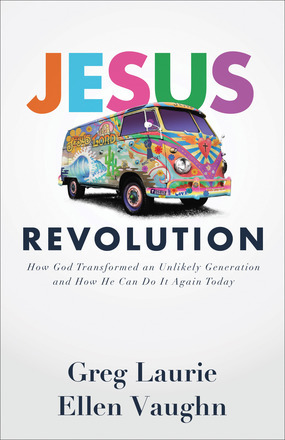 Jesus Revolution (Christianbook.com, Amazon)
Jesus Revolution (Christianbook.com, Amazon)
by Greg Laurie and Ellen Vaughn
Rarely have I read a book so entertaining, informative and spiritually significant as Jesus Revolution. I relived many formative historical events of the 60s and 70s and learned new and fascinating things about the Jesus movement. I can’t think of anyone better than Greg Laurie to be a central character and voice, nor better than Ellen Vaughn to skillfully craft this fascinating story of a powerful movement of the Holy Spirit. I loved it, and pray God would do such radical works of grace in our midst today!
 Knowing God (Christianbook.com, Amazon)
Knowing God (Christianbook.com, Amazon)
By J.I. Packer
I’ll never forget reading J.I. Packer’s Knowing God when it first came out in 1975. Right at the beginning of the book Packer quoted from an incredibly deep and profound sermon Spurgeon preached on God’s immutability. Then it stunned me when Packer said that Spurgeon had written and spoken that sermon at the age of twenty. I was twenty-one when reading the book, and like Spurgeon I had come to Christ at age fifteen. But this man was worlds beyond me in the knowledge of God. I wanted to read more Spurgeon, and above all to know God like Spurgeon did.
Introducing me to Spurgeon is just one of the ways God has used Knowing God in my life profoundly. It is still one of my top five books of all time.
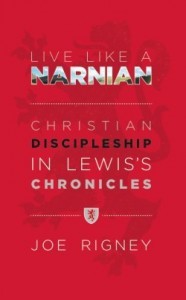 Live Like a Narnian: Christian Discipleship in Lewis's Chronicles (Amazon)
Live Like a Narnian: Christian Discipleship in Lewis's Chronicles (Amazon)
by Joe Rigney
As a long-time lover of C. S. Lewis and the world of Narnia, I have read countless books about both. Joe Rigney’s Live Like a Narnian is one of the best. It overflows with an authentic sense of Narnian brightness, wisdom and wonder. Rigney seems equally at home with Lewis’s fiction and nonfiction. He draws them together beautifully, with truth and imagination. I highly recommend this delightful book!
 Mere Christianity (Christianbook.com, Amazon)
Mere Christianity (Christianbook.com, Amazon)
by C. S. Lewis
Lewis argues brilliantly for the Christian worldview that he came to from atheism and agnosticism. I first read this book as a young Christian over forty years ago, and I’m amazed that it seems to get even better with time. (In fact, it plays a pivotal role in my novels Deadline and Deception.)
 Not By Sight: A Fresh Look at Old Stories of Walking by Faith (Christianbook.com, Amazon)
Not By Sight: A Fresh Look at Old Stories of Walking by Faith (Christianbook.com, Amazon)
by Jon Bloom
Jon Bloom is a Christ-centered, God-worshipping, kingdom-oriented guy, and a gifted writer of something we need more of—truthful nonfiction full of imagination. For years I have read Jon’s Desiring God blogs, and pondered them, saving some of them to quote from in future books. I love how John repeatedly takes me back to Scripture. God says his words won’t return to us empty. He never says that about my words, yours or Jon’s. That’s why Not By Sight will endure beyond this world—it is infused with the dynamic eternal Word of God that will never die.
 The Singer Trilogy (Christianbook.com, Amazon)
The Singer Trilogy (Christianbook.com, Amazon)
by Calvin Miller
Calvin Miller baptized my imagination when, as a young Christian, I read (and reread) his Singer trilogy. It greatly shaped and influenced me, which I got to tell Calvin personally twenty-five years later when we were the co-speakers at a Christian Writers’ Conference. Once Upon a Tree is poetic craftsmanship infused with grace. In the final book of the trilogy, The Finale, Calvin wrote: “The world is poor because her fortune is buried in the sky and all her treasure maps are of earth.” The whole thing is wonderful.
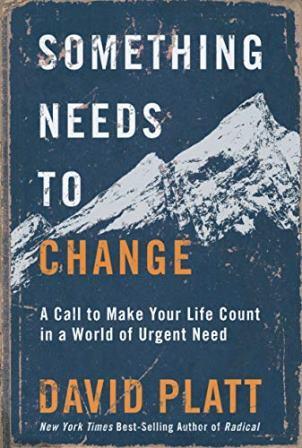 Something Needs to Change: A Call to Make Your Life Count in a World of Urgent Need (Christianbook.com, Amazon)
Something Needs to Change: A Call to Make Your Life Count in a World of Urgent Need (Christianbook.com, Amazon)
by David Platt
David Platt and I tend to be at the same conferences and I have often heard him speak. I skip some sessions but not David’s, because I never tire of his heart, his stories, or his sharing of God’s Word. This is a different book for David, but every bit as important as his others. I wholeheartedly recommend Something Needs to Change. God spoke to me through it and that’s the best I can say about any book.
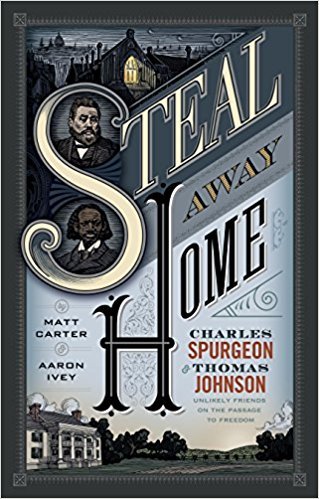 Steal Away Home: Charles Spurgeon and Thomas Johnson — Unlikely Friends on The Passage to Freedom (Christianbook.com, Amazon)
Steal Away Home: Charles Spurgeon and Thomas Johnson — Unlikely Friends on The Passage to Freedom (Christianbook.com, Amazon)
by Aaron Ivey & Matt Carter
I’ve long been a great fan of Charles Spurgeon. I wasn’t familiar with Thomas Johnson, and enjoyed reading about his part in the drama. As a fiction writer I appreciated the creative storytelling elements of this account. Matt Carter and Aaron Ivey have done a great job selecting historical realities and weaving them together into a compelling story. I really enjoyed Steal Away Home.
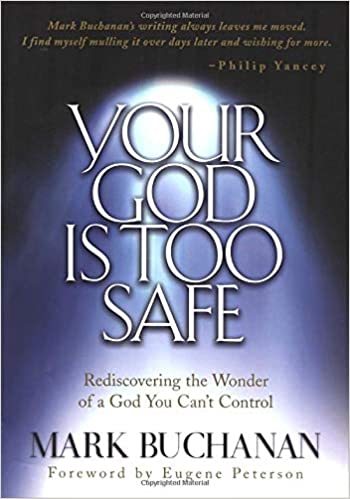 Your God Is Too Safe (Christianbook.com, Amazon)
Your God Is Too Safe (Christianbook.com, Amazon)
by Mark Buchanan
Mark Buchanan shows us that the undemanding God-in-the-bottle genie who exists to serve us is a modern heresy. It’s the God of the Bible who calls the shots. We are servants of a fierce King, who is gracious, but never manageable. Your God Is Too Safe reminds us what it means that Jesus is God—and we’re not! Dangerous faith in our untamed Savior leads us to the joy we crave. The breath of life rises off the pages of this book.
For many more suggestions, see my list of favorite books, both fiction and nonfiction. There’s plenty there to keep you busy!
 Finally, you might be interested in reading my devotional 60 Days of Happiness (Tyndale, Christianbook.com, Amazon). Someone kindly sent me this message: “I’m finding 60 Days of Happiness to be one of the best possible books (other than the Bible) for this particular time in history. I’ve ordered copies to be sent to all of my family and some friends, too. I gave some out at Christmas, and one dear friend of mine says it has totally changed her view of God and life—and this is a woman whose husband was a pastor for 30 years! She was saved, but didn’t seek happiness or even think about it.”
Finally, you might be interested in reading my devotional 60 Days of Happiness (Tyndale, Christianbook.com, Amazon). Someone kindly sent me this message: “I’m finding 60 Days of Happiness to be one of the best possible books (other than the Bible) for this particular time in history. I’ve ordered copies to be sent to all of my family and some friends, too. I gave some out at Christmas, and one dear friend of mine says it has totally changed her view of God and life—and this is a woman whose husband was a pastor for 30 years! She was saved, but didn’t seek happiness or even think about it.”
Photo by Sincerely Media on Unsplash
March 30, 2020
It Can Be Well with Our Souls, Even with the Coronavirus Crisis

This worship, posted a few days ago here in the Age of Corona, is beautiful. It demonstrates separation but the wonderous ability to transcend it. Technology isn’t always the answer, but in this case it is truly a gift of God. Here is “It Is Well with My Soul” from a cell phone choir:
(A friend I shared the video with loved it but pointed out it doesn’t include her favorite verse: "My sin, oh the bliss of this glorious thought, / My sin, not in part, but the whole / Is nailed to the cross and I bear it no more, / Praise the Lord, Praise the Lord, oh my soul!" She wrote, "I was asking myself why I like that verse so much. Whenever we sing the song, that particular verse fills my heart with joy and sorrow at the same time. Joy because my sins are washed away! Sorrow because I think of all the people who don’t know the Lord and are weighed down by the heavy burden of sin. Imagine how that burden must be so desperately hard! We know that the Holy Spirit is here to convict the world of sin, and righteousness, and judgment to come. And we know that He does His job well. So there are many people carrying a heavy burden. Imagine their joy when that sin is lifted and cast as far as the east is from the west. May many people turn to Jesus during this time of social isolation when there are moments to contemplate and listen to God.")
Either before or after you listen to the song—or maybe both, listen to it twice as I just did—consider the history behind the song “It Is Well with My Soul.” I wrote about it in my book If God Is Good:
Horatio Spafford, a prosperous lawyer, real estate investor, and devout Presbyterian elder, lived comfortably in Chicago with his wife, Anna, and their children.
The year of 1871 was a difficult one for the Spaffords. Much of Horatio’s real estate investments disappeared in the great Chicago Fire. Not long after, they lost their 4-year-old son to scarlet fever. But worse still was to come.
Knowing that his friend D. L. Moody would preach in England in 1873, Spafford’s family decided to vacation in Europe. Last-minute business detained Horatio, so Anna and their four girls sailed on the ocean liner S.S. Ville du Havre. En route, a British vessel rammed the ship, and it sank within minutes. Rescuers picked up an unconscious Anna on a floating spar, but all four daughters drowned. When Anna arrived in England, she sent a telegram to Horatio with the words, “Saved alone.”
Horatio immediately left Chicago to bring his wife home. On the Atlantic crossing, the captain called Horatio to his cabin to tell him that they had nearly reached the spot where his four daughters had perished. As he passed over their watery grave, Spafford wrote a hymn of profound depth that has touched millions: “It Is Well with My Soul.”
He later wrote to Anna’s half-sister, “On Thursday last we passed over the spot where she went down, in mid-ocean, the waters three miles deep. But I do not think of our dear ones there. They are safe, folded, the dear lambs.”
The pain was great, but God’s grace rose to the occasion. Despite his heartbreak, Spafford could say without pretense, “It is well with my soul.”
Only God can perform such a miracle of grace. And that kind of miracle is available to us all.
Knowing the story, listen to that song again, and it will be even more amazing than before!
Photo by Corinne Kutz on Unsplash
March 27, 2020
How Can We Be Unafraid of Bad News?

Psalm 112:7 says of the righteous person, “He is not afraid of bad news; his heart is firm, trusting in the LORD.” Charles Spurgeon wrote about this verse, “The fixedness of heart spoken of by the psalmist is to be diligently sought after. It is not believing this or that promise of the Lord, but the general condition of unstaggering trustfulness in our God, the confidence which we have in Him that He will neither do us ill Himself nor suffer anyone else to harm us. This constant confidence meets the unknown as well as the known of life.”
This article about Psalm 112, written by Desiring God’s Scott Hubbard a few years ago, is especially applicable now in the face of the coronavirus crisis. Instead of dreading the short-term future and further losses it can bring, may we daily trust our faithful God in whatever we face next, and look forward to our eternal future and the joys that God has promised await us. —Randy Alcorn
Beauty Is Born in Bad News
By Scott Hubbard
Editor, desiringGod.org
We live in a world of bad news.
It sweeps you away like a landslide: the middle-of-the-night call, the dire prognosis, the sudden job loss. Or it might just erode your sanity like a million raindrops in subtle rejections, disappointed hopes, and failed goals. Either way, we all know bad news. It comes to us as surely as the world is cursed.
If you receive enough of it, you may start to take self-protective measures. You look for refuge in cynicism, preparing yourself for the worst by only expecting the worst. Or you slide into apathy, telling yourself and others that you don’t really care what news comes. Or you hide away in isolation, avoiding any relationship or situation that might harm you.
You begin to dismiss risky opportunities out of hand. You don’t adopt a child, give to a missionary, cultivate deep friendships, or even ask someone out on a date — all for fear of potential bad news.
But there’s a better way.
Born into Bad News
Consider Psalm 112, a ten-verse portrait of “the man who fears the Lord” (Psalm 112:1). Bad news doesn’t harden this man into cynicism, numb him into apathy, or frighten him into isolation. No, his response to this world’s trouble is as surprising as it is unique: “He is not afraid of bad news” (Psalm 112:7).
Not afraid of bad news.
It’s not because bad news doesn’t come. The man of Psalm 112 knows the oppressive weight of darkness and the plots of enemies (Psalm 112:4, 8). He even makes decisions that all but guarantee bad news: fighting for justice in a corrupt culture, giving his money to the poor (Psalm 112:5, 9). Apparently, the prosperity-gospel promise of no bad news failed for this righteous man.
Bad news burdens all of God’s people, no matter how righteous. Joseph tasted the pain of hope deferred, from a pit in the wilderness to an Egyptian prison. Job felt bad news fall on his head like breakers: his cattle, then his kids, then even his own skin. John the Baptist heard whispers of a beheading as the guards approached his cell. And Jesus himself listened to his own people shout, “Crucify him!”
“Man is born to trouble as the sparks fly upward” (Job 5:7) — which means we are born into a world of bad news. But the man of Psalm 112 remains unafraid. “His heart is steady; he will not be afraid” (Psalm 112:8). How? Why?
Dead Wheat, Living Fruit
The author of the psalm gives us the answer: “his heart is firm, trusting in the Lord” (Psalm 112:7). He is unafraid of bad news because he trusts in the Lord. It’s a good answer, but we could use some handles. What about the Lord did he see that steadied his shaking heart?
The righteous man simply knew that his Lord would not let bad news have the final say. Jet-black clouds of bad news might be rolling toward him, but he knows the sunshine of God’s good news is in tow. “Light dawns in the darkness for the upright” (Psalm 112:4); he will look “in triumph on his adversaries” (Psalm 112:8). As this man traced God’s providence in the stories of Scripture, he saw a pattern emerge: God brings good news to his burdened people as surely as he brings sunshine after rain.
So Joseph’s painful imprisonment gives way to an appointment as prime minister. Job’s misery simmers for thirty-some chapters, then breaks forth into a new family and fortune. The Baptist’s beheading transfers him from prison to paradise. And the bad news of Good Friday entombs the Son of God, only to have the stone roll away on Easter morning. Jesus himself was cast down dead in the dirt like a grain of wheat — and the world still cannot restrain the fruit from that death (John 12:24). Our good-news God gives “a beautiful headdress instead of ashes, the oil of gladness instead of mourning, the garment of praise instead of a faint spirit” (Isaiah 61:3).
It’s not that the ashes, mourning, and faint spirit aren’t real. They are — as real as Jesus’s tomb. But like the tomb, they’re also temporary. You may lie battered in a tomb of bad news for three days, or for a stretch of miserable months, or even for many sorrowful years. But Sunday is always coming, and God will exchange your death for resurrection.
Set it down as a theological axiom: for all who are in Christ, bad news prepares the way for good news.
Sing in the Rain
Our reflex may be to raise our self-protective walls, choosing cynicism, apathy, isolation, and a host of other building materials to shield us from the pain. But anyone who has sought refuge that way knows it’s no escape. The raindrops of bad news fall with enough regularity to wear through any shelter.
Our other option is to link arms with the man of Psalm 112, standing with him as he overlooks the vista of biblical history and sees God pierce the clouds of his people’s anguish. We will own his realism, on the one hand, and affirm that bad news is coming. But we also will share his trust in the Lord — the same Lord who turned a cross into good news of great joy (Luke 2:10).
When that sort of God is for you, you can see the storm approaching and stand unafraid.
More than that, you can sing even in the driving rain.
This article originally appeared on Desiring God and is used with permission of the author.
Photo by Issara Willenskomer on Unsplash
March 25, 2020
What Christ’s Followers Need to Know, Be, and Do in Difficult Times

I was asked a few days ago three questions related to our finances and needed perspective during these challenging times with the COVID-19 (coronavirus) crisis.
Honestly, our needs as Christ followers right now are the same as they are in times of ease, plenty, and comfort. But suffering and difficulty can make our calling and purpose much clearer. Puritan Thomas Watson said, “God takes away the world, that the heart may cleave more to Him in sincerity.” Let’s not waste this difficult season, but instead use it to study and learn and grow in the grace and knowledge of our Lord and Savior (2 Peter 3:18).
The grace that saves us is also the grace that sanctifies and empowers us. God’s power isn’t needed just by unbelievers to be converted. It’s needed by believers to be obedient and joyful. This is the grace Jesus offers you today, and every day, as you seek to follow Him faithfully.
What do we need to know?
We need to know who our God is and that He has many attributes, and not just love. (I highly recommend J. I. Packer’s book Knowing God, as well as Wayne Grudem’s large Systematic Theology and also his abridged Bible Doctrine.) We need to know all that’s true about Him, including His sovereignty, justice, love, grace, wrath, happiness, mercy, patience, unchangeableness (immutability), and His providential workings to bring about His eternal plan. A central part of that plan is using adversity to topple our idols, including the idols of health and wealth, and to make us more Christlike, and thereby more faithful representatives of the Jesus we proclaim. This will result in people being drawn toward faith in Him.
“WE KNOW [not wish or hope] that in all things God works for the good of those who love him, who have been called according to his purpose” (Romans 8:28). “Now this is eternal life: THAT THEY KNOW YOU, the only true God, AND JESUS CHRIST, whom you have sent” (John 17:3). We need to know that the people of God will truly live happily ever after with Jesus and each other on the New Earth, a redeemed world that is our true country and our eternal home. This is not wishful thinking, but the blood-bought promise of the risen King Jesus. Meanwhile we are pilgrims, strangers, and aliens in this fallen world, and we should never expect anything in it to meet our deepest needs, which can only be met in Him (Hebrews 11:13-17).
What do we need to be?
We need to be disciples who bear Christ’s likeness, including integrity, trust, and faithfulness to God. We need to be trusting children who believe the promises of God, not the promises of American pop culture and celebrities and financial cheerleaders, including Christian ones, who are convinced America’s long-term prosperity is a given, somehow guaranteed. (Where do you find that in the Bible?)
We need to be people who realize our dependence on our Savior and King, and that apart from Him all we do amounts to nothing: “I am the vine; you are the branches. If you remain in me and I in you, you will bear much fruit; apart from me you can do nothing” (John 15:5).
We need to be Christ’s ambassadors (2 Corinthians 5:20), meaning that we accurately and unapologetically represent who He is, what He believes, and what He says is true. Our job isn’t to be His make-up artists, speech writers, or PR staff who go before Him, but His servants who follow behind Him and faithfully convey His true agenda, whether or not others like it or we’re comfortable doing it.
We need to be children who understand “God disciplines us for our good, in order that we may share in his holiness” and “no discipline seems pleasant at the time, but painful. Later on, however, it produces a harvest of righteousness and peace for those who have been trained by it” (Hebrews 12:10-11). Richard Sibbes said, “When we grow careless of keeping our souls, God recovers our taste of good things by sharp crosses.” So we should be people who see that “our light and momentary troubles are achieving for us an eternal glory that far outweighs them all” (2 Corinthians 4:17).
What do we need to do?
We need to love the Lord our God with all our hearts, minds, souls, and strength. We need to love our neighbors as ourselves, caring not only about our children but all children.
We need to ask God for wisdom and seek to act wisely (James 1:5) but also lovingly, which sometimes means taking great personal risks for the good of others who need our help. “What does the LORD require of you but to do justice, and to love kindness, and to walk humbly with your God?” (Micah 6:8). We need to understand that some things are far worse than death, and failing to walk with Him and obey Him and be willing to die for Him are among them. “If anyone would come after me, let him deny himself and take up his cross daily and follow me. For whoever would save his life will lose it, but whoever loses his life for my sake will save it” (Luke 9:23-24).
We need to store up our treasures in Heaven, not on Earth, knowing that they are never safe when stored up on earth, but only when placed in the hands of our God in Heaven (Matthew 6:19-21; 1 Timothy 6:17-19).
We need to happily serve Him in a spirit of continuous prayer, overflowing with joy and gratitude: “Rejoice always, pray without ceasing, in everything give thanks; for this is God’s will for you in Christ Jesus” (1 Thessalonians 5:16-18). We need to adopt an eternal perspective, and “fix our eyes not on what is seen, but on what is unseen, since what is seen is temporary, but what is unseen is eternal” (2 Corinthians 4:18). Knowing our Lord went to Hell for us on the cross so we could live with Him forever in Heaven, even in hard times we should fix our eyes on Him and “sing” and “shout for joy” and “be happy and rejoice with all our hearts” (Zephaniah 3:14, NCV).
See also the two videos I recorded with two pastors at my home church: God’s People Need an Eternal Perspective During the Coronavirus Crisis and Tackling Some of the Tough Questions Related to the Coronavirus. To access many other biblical perspectives on the coronavirus crisis, visit epm.org/coronavirus, which EPM staff member Stephanie Anderson compiled and which we’ll be updating as we see great new resources.
March 23, 2020
Putting Our Hope in God’s Ownership and Provision in Times of Financial Worry

Many people, including many readers of this blog, are facing some level of financial uncertainty right now because of the coronavirus crisis. These are challenging times, and you may find yourself worrying, and wondering what the future might hold. I believe one of the best things we can do to find encouragement and perspective in times like these is to start by remembering God’s ownership.
He Owns It All
From beginning to end, Scripture repeatedly emphasizes God’s ownership of everything:
“To the Lord your God belong the heavens, even the highest heavens, the earth and everything in it” (Deuteronomy 10:14).
“The land is mine and you are but aliens and my tenants” (Leviticus 25:23).
“Yours, O Lord, is the greatness and the power and the glory and the majesty and the splendor, for everything in heaven and earth is yours. Yours, O Lord, is the kingdom; you are exalted as head over all. Wealth and honor come from you; you are the ruler of all things” (1 Chronicles 29:11-12).
“Who has a claim against me that I must pay? Everything under heaven belongs to me” (Job 41:11).
“The earth is the Lord’s and everything in it, the world, and all who live in it; for he founded it upon the seas and established it upon the waters” (Psalm 24:1-2).
“For every animal of the forest is mine, and the cattle on a thousand hills. I know every bird in the mountains, and the creatures of the field are mine. If I were hungry I would not tell you, for the world is mine, and all that is in it” (Psalm 50:10-12).
“‘The silver is mine and the gold is mine,’ declares the Lord Almighty” (Haggai 2:8).
Not only does God own everything, but He grants us our money-making skills and determines how much of His wealth He will entrust to us:
“Remember the Lord your God, for it is he who gives you the ability to produce wealth” (Deuteronomy 8:18, NIV).
“The Lord makes poor and makes rich; He brings low and lifts up” (1 Samuel 2:7, NKJV).
In my books Money, Possessions, and Eternity and Managing God’s Money, I share how a distraught man furiously rode his horse up to John Wesley, shouting, “Mr. Wesley, Mr. Wesley, something terrible has happened. Your house has burned to the ground!” Weighing the news for the moment, Wesley replied, “No. The Lord’s house burned to the ground. That means one less responsibility for me.”
Wesley’s response wasn’t the sanctimonious reply of someone who thought I’d be quoting his words hundreds of years later. We might say, “Get real,” but his reaction didn’t stem from a denial of reality. Rather, it sprang from life’s most basic reality—that God is the owner of all things, and we are simply His stewards. When we realize our possessions belong to God and not us, it removes from us the burden of worry or despair. What we value most, the treasures we will enjoy for eternity, are in Heaven, not on earth.
Will We Trust Him?
In Reflections of God’s Glory, Corrie ten Boom, who traveled the world speaking and sharing about God’s love, said, “My finances are always in the realm of God’s miracles. He is my heavenly treasurer. When I need money—and I often do—I say to Him, ‘Father in Heaven, in the Bible it says that you have cattle on a thousand hills. That’s quite a lot. Will you sell Your cows and give me the money?’ He always does so.”
If we believe that God can create us, redeem us, and bring us through death to spend eternity with Him, why can’t we take Him at His word when He says He’ll provide for our material needs? “The Lord is my shepherd; I have what I need” (Psalm 23:1, CSB). (God wants an opportunity either to provide for our needs or to show us that they aren’t really needs.)
Jesus said, “Seek first his kingdom and his righteousness, and all these things [what you eat, drink, and wear] will be given to you as well” (Matthew 6:33). Unlike the pagans who “run after all these things” and “worry about tomorrow,” believers are told to follow Christ, live a radical life of faith, and trust God to provide (Matthew 6:25-34). In this passage, Jesus says that God cares for the birds. Yet birds aren’t created in God’s image. Christ didn’t die for birds. The Holy Spirit doesn’t indwell birds. Birds won’t reign with Christ. But we will! So Christ asks His disciples, “Are you not much more valuable than they?” (Matthew 6:26). If He takes care of the less valuable creatures, will He not take care of us, who are far more valuable?
If God calls on you today to share your resources with another, you must not say, “I can’t, Lord, because I don’t know where my own provisions are coming from.” Yes, you do know where they’re coming from. They’re coming from God, the owner of all. You may not know the form this provision will take, but you do know the Source. Like the poor widow who had no cash reserves, you know that God will take care of you, even if there are no visible resources. Of course, this doesn’t mean that you won’t face hardship, including financial difficulties and pressures. It does mean that you can trust Him.
Where Is Our Hope?
Financial concerns can help us evaluate what our real hope is in. All of us trust in something. The more dependable the object of our trust and hope, the less we need to worry. The stock market isn’t God, the Wall Street Journal isn’t the Bible, your asset manager isn’t your pastor, and financial experts aren’t prophets. (Prophets were put to death when their prophecies didn’t come true!) That doesn’t mean the stock market is bad, but it does mean it’s not trustworthy. It may do well for a day, a month, a year, or even a few decades. But because the stock market is uncertain, it can only produce anxiety when it becomes the object of our trust. God is the only totally trustworthy object. Therefore, He’s the only one who cannot betray our trust.
The Apostle Paul says that the rich should not “put their hope in wealth, which is so uncertain, but . . . in God, who richly provides” (1 Timothy 6:17). The one whose greatest riches are deposited in the bank will be destroyed when the banks fail, as will the farmer whose greatest asset is in crops when the crops fail or when the commodity markets fall. In contrast, the one whose hope is in God will be devastated only if God fails—and He never does.
Elliot Clark writes in Evangelism as Exiles: Life on Mission as Strangers in Our Land,
Hope for the Christian isn’t just confidence in a certain, glorious future. It’s hope in a present providence. It’s hope that God’s plans can’t be thwarted by local authorities or irate mobs, by unfriendly bosses or unbelieving husbands, by Supreme Court rulings or the next election. The Christian hope is that God’s purposes are so unassailable that a great thunderstorm of events can’t drive them off course. Even when we’re wave-tossed and lost at sea, Jesus remains the captain of the ship and the commander of the storm.
Consider these verses from the Psalms, reminding us to put our hope in God:
“And now, O Lord, for what do I wait? My hope is in you” (Psalm 39:7).
“For God alone my soul waits in silence; from him comes my salvation. He alone is my rock and my salvation, my fortress; I shall not be greatly shaken. … For God alone, O my soul, wait in silence, for my hope is from him” (Psalm 62:1-2, 5).
“The LORD upholds all who are falling
and raises up all who are bowed down.
The eyes of all look to you,
and you give them their food in due season.
You open your hand;
you satisfy the desire of every living thing.
The LORD is righteous in all his ways
and kind in all his works.
The LORD is near to all who call on him,
to all who call on him in truth.
He fulfills the desire of those who fear him;
he also hears their cry and saves them” (Psalm 145:14-19).
May the truth of God’s ownership of all, His providence over everything, and His promise to provide for His children’s needs help you completely put your hope in Him, whatever the coming days, weeks, and months may bring.
Photo by Patrick Hendry on Unsplash
March 20, 2020
Tackling Some of the Tough Questions Related to the Coronavirus

Last weekend, together with my friends Greg Cahalan and Steve Keels, pastors at my home church, Good Shepherd Community Church, we recorded two messages for our church body. In our first video, which was part of Wednesday’s blog, we talked about the need for God’s people to have an eternal perspective by focusing on and studying Scripture. In this second video, we tackled some of the difficult theological and practical questions Christians may have related to the coronavirus crisis.
I hope you find the following, as well as our video discussion, helpful.
Some readers expressed concern that we were being unwise and setting a bad example by sitting together at the same table. These videos were filmed last Saturday, when the latest information we had here in Oregon was that the governor had cancelled meetings of groups over 250. Meetings over 20 were strongly discouraged, so only a few people were involved with this filming. As this last week has gone on, many families here in Oregon are now practicing social distancing and staying at least six feet apart from others. As I watched the first video, I realized I was praying with my face in or on my hands, which many of us did and by instinct will still tend to do. All the new recommendations make sense; it just takes time to retrain myself. I’m sure the new habits will sink in, probably about when this is over! But please have understanding and realize that in the past week there has been more change in interpersonal social norms than in the past 50 years! Don’t disregard this, or any message, just because brand new guidelines weren’t fully in place a week ago when we were filming.
What can we learn from Christians throughout history who have faced epidemics?
When we study history, we learn past epidemics were way more severe than anything we’ve faced. That’s not to minimize the coronavirus, because in in my lifetime, nothing like this has happened, at least here where I live. But there are, presently, terrible epidemics in other countries, including malaria and tuberculosis, that have largely not touched those of us in the modern-day U.S.
I’ve done some reading about the Plague of Cyprian, which happened in AD 249 to 262. At its peak, five thousand people died every day in Rome alone. Christians were blamed for the plague, but it became apparent that wasn’t true since Christians died long with everyone else. In fact, Christians were actually caring for those who were sick, including their pagan neighbors. Some of them died as a direct result.
Certainly we shouldn’t take unnecessary risks today. But sometimes risks are necessary for us to be obedient to Jesus. There are things worse than death, and disobedience for the believer is worse than death. Paul reminds us that “To live is Christ, and to die is gain” (Philippians 1:21). We don’t seek to die, of course, but we are willing to die if that’s what’s necessary to love our neighbors and serve the Lord.
Are we willing to pray, “Lord, if you’re given me a needy neighbor and it involves some risk for me to help them, then that risk is right”? That’s what God’s people have done throughout the ages with far fewer resources than we have available today. Let’s look at this as an opportunity to help others, pray for them, and bring the gospel of Jesus to them.
I am struck by how timely Martin Luther’s nearly 500 year old advice to believers is, when they were facing the Plague of 1527:
You ought to think this way: “Very well, by God’s decree the enemy has sent a pestilence… I shall ask God mercifully to protect us. Then I shall… administer medicine, and take it. I shall avoid places and persons where my presence is not needed in order not to become contaminated and thus perchance infect and pollute others… If people in a city were to show themselves bold in faith when a neighbor’s need so demands, and cautious when no emergency exists, and if everyone would help ward off contagion as best he can, then the death toll would indeed be moderate. But if some are too panicky and desert their neighbors in their plight, and if some are so foolish as to not take precautions but aggravate the contagion, then the devil has a heyday and many will die.” —Martin Luther on "Whether One May Flee from a Deadly Plague"
We need to remind ourselves not only of church history, but also of our brothers and sisters in Christ around the world today who are still risking themselves for the good of the gospel and the glory of God.
For example, Samaritan’s Purse just sent a group of medical personal over to Italy to set up an emergency field hospital. Some of them could die in the process. This is what it looks like sometimes to follow Jesus. I am proud of them. Today our ministry is sending $10,000 to them, and we will be sending more to them or other ministries. (On this subject, I highly recommend John Piper’s small book Risk Is Right: Better to Lose Your Life Than to Waste It, available online for free.)
Should the Church submit to the government’s orders because of the coronavirus?
Romans 13 makes clear that God’s people should submit to the authorities God has appointed. Is there a time when Christians are compelled not to submit to the government, or even mandated not to? Yes, there are clear biblical examples of when that is necessary. Peter and the Apostles told the Sanhedrin: “We must obey God rather than men” (Acts 5:29).
Could there come a time in our culture when gathering together is illegal? That’s already true in other places around the world, such as Iran. If the time ever came in America when we were not allowed to have religious gatherings, then I would be the first to call for civil disobedience.
But now is not that time. In the video, we’re certainly not saying that we should always unconditionally obey the government, but unless there’s a compelling reason to disobey, we obey. As Greg points out, right now as churches, we just need to gather differently, through online means. The right thing to do, out of love, is to work together to try to contain this virus. (If you’re interested for more biblical perspectives on the topic of civil disobedience, see this article I wrote years ago when I was involved in civil disobedience to save the unborn.)
Is the coronavirus God’s judgment?
Could this virus be a judgment of God? Yes.
Could it be the grace of God extended to save unbelievers from the fire of hell, and to save believers from a life that’s wasted? Yes.
God is getting our attention through this crisis. Could that be His purpose? Yes.
God is disciplining us as His children to get our eyes on Him. Hebrews 12 says He disciplines us for our good.
The purpose behind this crisis is probably all of those things in one way or another, but it’s not up for us to say, “Oh, I know why that person got the Coronavirus. It’s because he’s an unbeliever.” Believers have gotten sick, too, just as they have during other plagues throughout world history.
Unless God clearly reveals it, we should never assume that an epidemic or natural disaster or moral atrocity comes upon this earth as His specific judgment on specific people. Jesus made this clear by saying that some people murdered by Pilate and those crushed by a falling tower were no worse sinners than others (see Luke 13:2–5).
Is the coronavirus a sign Jesus is coming soon?
It’s easy to say, whenever we see a crisis, “This must be the end times!” But we’ve been living in the “end times” for 2,000 years, since Jesus’ ascension. This era, in Scripture, is called the end times.
Now is this the “real” end? Christ certainly could return today, or any moment. His return has always been imminent. We need to be ready, but we also shouldn’t think, “I don’t need to plan for the future because obviously Jesus is coming very soon.” Let’s be ready for His coming, but let’s not presume we know exactly when it’s going to happen.
What if all the people throughout history who thought Jesus would return in their lifetime had been right? You and I wouldn’t have been born. So look for His coming, pray for His coming, but also look for what you can do to facilitate it. He’ll return after the last martyr is killed (Revelation 6:11) and after the last convert is converted, but meanwhile we’re to serve Him faithfully, not knowing the hour of His return, but knowing He knows and has a perfect plan. (See What Do You Think About Linking Current Events to the End Times?)
In Matthew 6, Jesus talks about storing up treasures in Heaven, not on earth. When we consider the massive amounts of money being lost in investments right now (maybe they will be restored and maybe they won’t), we should ask ourselves, “What if we hadn’t stored so much wealth on earth but had given it to God’s kingdom instead? Could we have already reached all the tribes and nations of the earth?” That’s not meant to be negative, but to make us realize the importance of a giving mentality instead of storing up so much for ourselves.
How do we balance wise planning and providing for our families with caring for the needy in our communities?
It all comes back to seeking wisdom from the Lord. He tells us that if we lack wisdom, we can ask Him and He “will give it generously without finding fault” (James 1:5). Let’s find a balance. When it comes to getting groceries and supplies, take a reasonable amount. Now, to some people “reasonable” means storing up a large amount, but we must remember that affects other people. The elderly and the needy are not fighting the lines at Costco. They’re not able to do that! If you do have extra, and even if you don’t, take what you have and share it.
Is there a time for planning? Sure. It can be wise to store up some extra food, all the while trusting God, and remembering that what you have is not just for you, but so that you might help others and be generous and willing to share (1 Timothy 6:18). (For more perspectives, see my book Giving Is the Good Life: The Unexpected Path to Purpose and Joy.)
To access many other biblical perspectives on the coronavirus crisis, visit epm.org/coronavirus , which EPM staff member Stephanie Anderson compiled and which we’ll be updating as we see great new resources. You’ll find articles, videos, and audios that relate to the major themes we discussed in the video. Please let us know as you see other resources we might share. We are all in this together.
Photo by Markus Spiske on Unsplash
March 18, 2020
God’s People Need an Eternal Perspective During the Coronavirus Crisis

Last weekend I sat down with my friends Greg Cahalan and Steve Keels, pastors at my home church, Good Shepherd Community Church, and we recorded a message for our church body. For the first time in our 43-year-old history, with the exception of a few snowstorms, we were unable to physically gather. Just two days before the governor had banned all gatherings of over 250 people. Our pastors were scrambling and asked me to join them in opening God’s Word and bringing an eternal perspective to this unprecedented Coronavirus/Covid-19 crisis.
In this time, God’s people need to be reminded that He is sovereign, and is not taken by surprise. He is the God of providence who raises up not just Esther, but each of us for “such a time as this” (Esther 4:14). Many people have told me they were touched by all the passages we were able to share emphasizing God’s sovereignty in this and all other situations.
Greg, Steve, and I discussed several passages, including Romans 8, Matthew 6, and Philippians. I appreciated Greg’s words, “Our role as followers of Jesus is to be the light of the world and the salt of the earth. We’re called to be witnesses to Jesus in the power of the Holy Spirit. …We want to express our faith through love so that the people around us can give glory to our Father in Heaven.”
While we need to take reasonable precautions, of course, all of us sought to encourage people to resist the bunker mentality that withdraws from others and fails to love them as Jesus commanded us, He Himself being the greatest example for us to follow.
In order to have that right perspective, we have to turn the news off and close the social media feeds. Honestly, there’s only so much information we can handle without being overwhelmed! If we’re going to see the eternal, we have to listen to something other than all the voices of the culture. God’s Word needs to guide us. In fact, the extra time we have because of cancelled events can be a gift from the Lord, allowing us to meditate on His Word day and night (Psalm 1:2, Joshua 1:8), and to lead our families in knowing and trusting Him.
Jesus tells us, “Peace I leave with you; my peace I give to you. Not as the world gives do I give to you.” Then He says, “Let not your hearts be troubled, neither let them be afraid” (John 14:27). This means there are some things we can do to keep from being fearful and worried about this crisis. We can go to God in prayer, talk to people of faith, and claim the true promises of God. God gives us reasons not to worry. But in order to trust Him, we’ve got to meditate on His words.
God never promises that everything in life will go smoothly. But we see in Scripture that He does promise us eternal life, forgiveness, unfailing love, faithfulness, joy, comfort, purpose, strength, His intercession, His friendship, and eternal rewards. All who know Jesus are going to have a happy ending. The story is going to have a great conclusion!
So don’t let the Coronavirus or anything else distract you from the promises of God, or rob you of living the life God has given you. Live for Jesus in the midst of this, and you may come out on the other side, as we do so many of the trials of our lives, saying, “God, you taught me more and drew me closer to you through this crisis than any other time of my life.”
God brings Christlikeness into our lives through how we respond to suffering. Our trials are not just meant to be something we endure. Trials, including the Coronavirus, are things that God can use—and desires to use—to cultivate Christlikeness and achieve something in us.
We’ve gotten amazing feedback from our church body, fully knowing that thousands of other churches across the nation and around the world were also unable to gather, many of them for the first time. And many of them were likely talking about the same kind of glorious truths we were. I hope this video discussion encourages you to have a God-honoring perspective:
To access many other biblical perspectives on the coronavirus crisis, visit epm.org/coronavirus, which EPM staff member Stephanie Anderson compiled and which we’ll be updating as we see great new resources. You’ll find articles, videos, and audios that relate to the major themes we discussed in the video. Please let us know as you see other resources we might share. We are all in this together.
Photo by Aaron Burden on Unsplash
March 16, 2020
Ray Ortlund on How God Will Use Time and Trials to Accomplish His Purpose for You

This article by Ray Ortlund is thought-provoking and on target. Though his advice focuses on young men in ministry, his message is applicable for every believer of every age and vocation.
Ray writes, “Only men with scars can preach a Savior with scars to sinners with scars. So, in addition to the many insights and skills God will impart to you, he also will wound you. …At some point in your life, God will injure you so extremely that the self-reliance you aren’t even aware of, the self-reliance you’ve been navigating so consistently by that it feels natural and innocent, will collapse under the loss and anguish. You will start realizing, ‘Oh, so this is what it means to trust the Lord.’”
After forty-five years in ministry, I completely agree. I’ve learned we can’t become humble and fully useful to God’s work without experiencing tears and trials. It just doesn’t happen. Notice Paul ties these together when he talks to church leaders: “You yourselves know how I lived among you the whole time from the first day that I set foot in Asia, serving the Lord with all humility and with tears and with trials” (Acts 20:18-19).
As Nanci and I navigate life with her ongoing battle with cancer, we are not fighting God, but are trusting Him daily and seeing Him at work. Through this trial, as with others, over the course of time, God is accomplishing something very precious. He is making us into deeper and more Christlike people, marked forever by Jesus’ grace, so that He can use us in greater, unexpected ways to impact His kingdom. God tells us, “Patient endurance is what you need now, so that you will continue to do God’s will. Then you will receive all that he has promised” (Hebrews 10:36, NLT). I hope you find this article as helpful and ultimately encouraging as I did. —Randy Alcorn
Your Ministry Will Take a Lifetime: My Counsel for Younger Men
By Ray Ortlund
Some of us can read a text like “The path of the righteous is like the light of dawn, which shines brighter and brighter until full day” (Proverbs 4:18) and wonder why our light still feels so dim.
The verse teaches that if you are walking with the Lord, your life is dawning more and more with “Christ in you, the hope of glory” (Colossians 1:27). The passing years of his care are making you more compelling, more relevant, more fruitful — not less. And someday soon your glory will blaze like the noonday sun, never to fade.
This article is for every young man who feels that his glory is taking too long to become obvious. This is for every young man in ministry who feels restless and eager and ambitious (with godly ambition) for more opportunities to make his mark for Christ. Yes, you have mixed motives. Who doesn’t? But your desire to cut a wide swath of gospel harvest is of God.
He did not create you to be a zero. He created you in his image, as royalty, to advance his purposes in this world (Genesis 1:26). You are a man of destiny, and you feel it. So let’s think about your life trajectory — what to expect, how to navigate it well. I offer my thoughts as an older man, who respects how you feel. Let me offer you three words of counsel, prompted by Scripture, for when your ministry seems to be growing too slowly.
Give Yourself Time
First, “Let them also be tested first” (1 Timothy 3:10). The apostle Paul required that of prospective deacons. But a young man being tested, giving him time to prove his readiness for leadership, is implicit in the requirements of an elder too. A future elder must be faithful in marriage, able to teach, manage his own household well, not a recent convert, and well thought of by outsiders (1 Timothy 3:1–7). No one gets there quickly or easily.
You might feel more ready than you really are. Maybe you’ve looked at an older Christian leader in action and thought, “I could do what he’s doing — and maybe better.” But what that man is doing is harder than it looks. When a senior leader is performing well and people are responding and the ministry is flourishing, the reality is this: Hidden deep within that man, nuanced understandings and finely-honed skills and mature disciplines are converging, moment by moment, to make him compelling.
All those inner strengths and assets of his were hard won over many years — and through some failures too. When a pastor, for example, makes the ministry look easy, you can be sure of one thing: it isn’t. He was tested first. He is being tested now. Even in a man’s mature years, ministry is always extremely demanding. Joyful and satisfying, but demanding.
I am not exalting him or diminishing you. I am only saying that a man in his sixties, if he has walked humbly with God and striven to keep growing and growing, is a more profound man than he himself was in his thirties. How could it be otherwise? So, give yourself time. God is faithfully investing in you, more than you can see. He values you. He is preparing you for the final, climactic mission of your life and your death. Don’t resent his maturing process along the way.
His plan, his timing, his methods are well suited to get you ready for the greatest moments of your life still out ahead. But if your pride can’t stoop to being tested first, you are blocking the very future you long for. Humble yourself, be patient, go deep. And don’t forget to enjoy it along the way. The Lord is with you and for you. Obviously, he isn’t in any hurry. Why should you be?
Embrace His Power in Weakness
Second, “My power is made perfect in weakness” (2 Corinthians 12:9). Here is why this familiar verse is in the Bible. In our foolishness, we all want to be formidable, impressive, noteworthy, with super-powers to “wow” the world. But how can men like that preach Christ crucified (1 Corinthians 2:1–5)? Only men with scars can preach a Savior with scars to sinners with scars. So, in addition to the many insights and skills God will impart to you, he also will wound you. A.W. Tozer wisely said, “It is doubtful whether God can bless a man greatly until he has hurt him deeply.”
At some point in your life, God will injure you so extremely that the self-reliance you aren’t even aware of, the self-reliance you’ve been navigating so consistently by that it feels natural and innocent, will collapse under the loss and anguish. You will start realizing, “Oh, so this is what it means to trust the Lord. I need him now with an urgency, a desperation, a seriousness of purpose deeper than ever before.”
And then God will come through for you. And you will emerge from that suffering a deeper saint. You will be a better preacher and pastor and leader and counselor and teacher and friend, because you will be a better man — more like the wounded Christ himself.
But if you “succeed” early, and crowds of people are flocking to you, and the undiscerned cockiness you grew up with isn’t broken, you may be in danger. I have seen highly gifted young men crash and burn and lose years of fruitful ministry, or even leave the ministry altogether, because their platform exceeded their character.
Don’t envy that “rising star.” He might be more precarious than he appears. You just stay low before the Lord. Humbly receive the buffetings, disappointments, and insults coming your way. Receive them “for the sake of Christ” (2 Corinthians 12:10). They are how his power will come to rest upon you (2 Corinthians 12:9).
Don’t Grope at Your Destiny
Third, “The Lord will fulfill his purpose for me” (Psalm 138:8). You never have to get pushy, because the Lord has a purpose for you, and that purpose belongs to him. John Burroughs, the poet, was not a Christian. But his poem “Waiting” says a very Christian thing:
Asleep, awake, by night or day,
The friends I seek are seeking me,
No wind can drive my bark astray
Nor change the tide of destiny.
Because the Lord is committed to his purpose for you, the friends and the opportunities you seek are seeking you. They are on their way toward you this very moment. Believe it, and rejoice as God tells the story you were born for. The best way to get ready for your future is to walk humbly, fruitfully, and cheerfully with Christ right where you are. Through the years, he will give you a front-row seat for watching him fulfill his purpose for you.
Seek the Lowest Place
Francis Schaeffer, in his prophetic sermon “No Little People, No Little Places,” warned us all,
Jesus commands Christians to seek consciously the lowest room. All of us — pastors, teachers, professional religious workers and non-professional included — are tempted to say, “I will take the larger place, because it will give me more influence for Jesus Christ.” Both individual Christians and Christian organizations fall prey to the temptation of rationalizing this way as we build bigger and bigger empires. But according to the Scripture this is backwards: We should consciously take the lowest place, unless the Lord himself extrudes us into a greater one.
Schaeffer went on to explain that, in a lower, less intense place of ministry, we face fewer distractions away from our own intimacy with God. And it is only in personal quietness before God that we can do anything that is truly spiritual in power. It is only as we remain quiet before him that we contribute to the real battle being fought in our generation.
Settle into the place where you are. Deeply accept your present moment. It is where Jesus is nearest to you. It is where his endless resources open up to you, moment by moment: “Oh, how abundant is your goodness, which you have stored up for those who fear you!” (Psalm 31:19).
This article originally appeared on Desiring God and is used with permission of the author.
Photo by Matt Duncan on Unsplash



